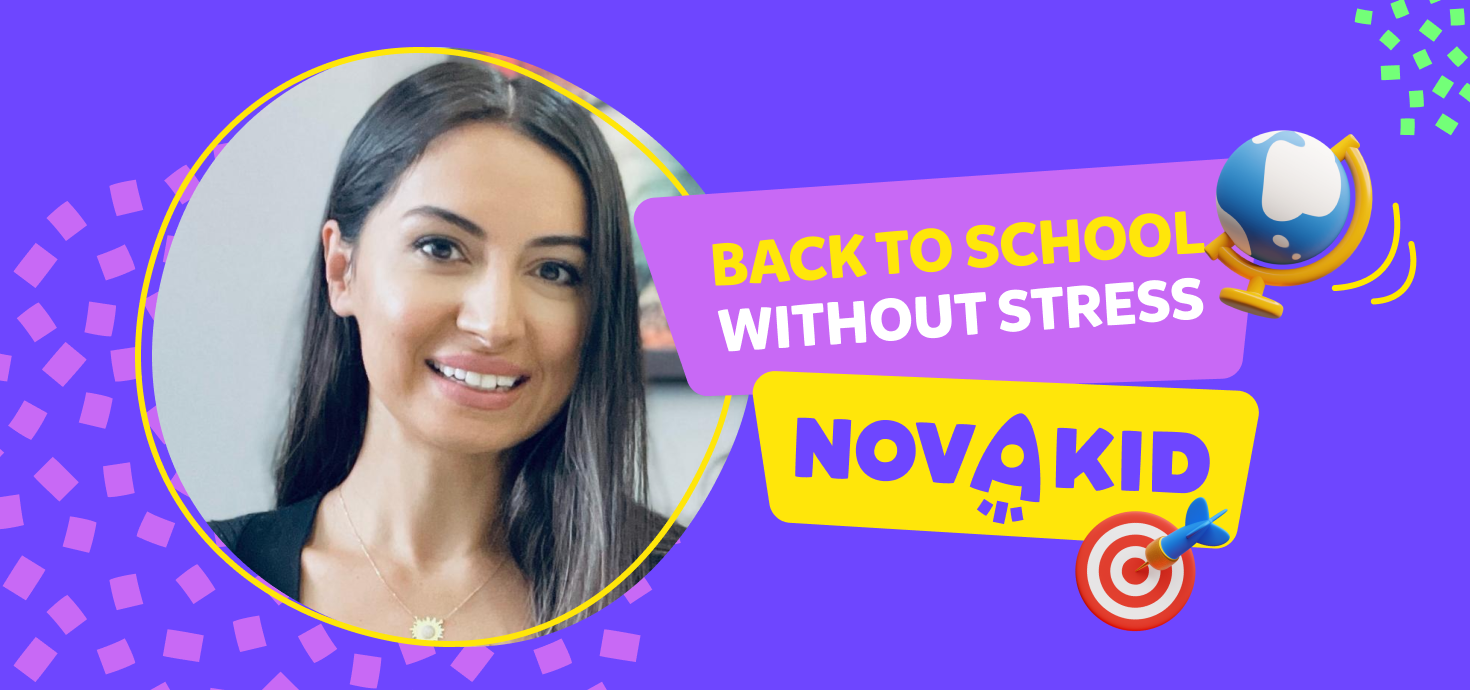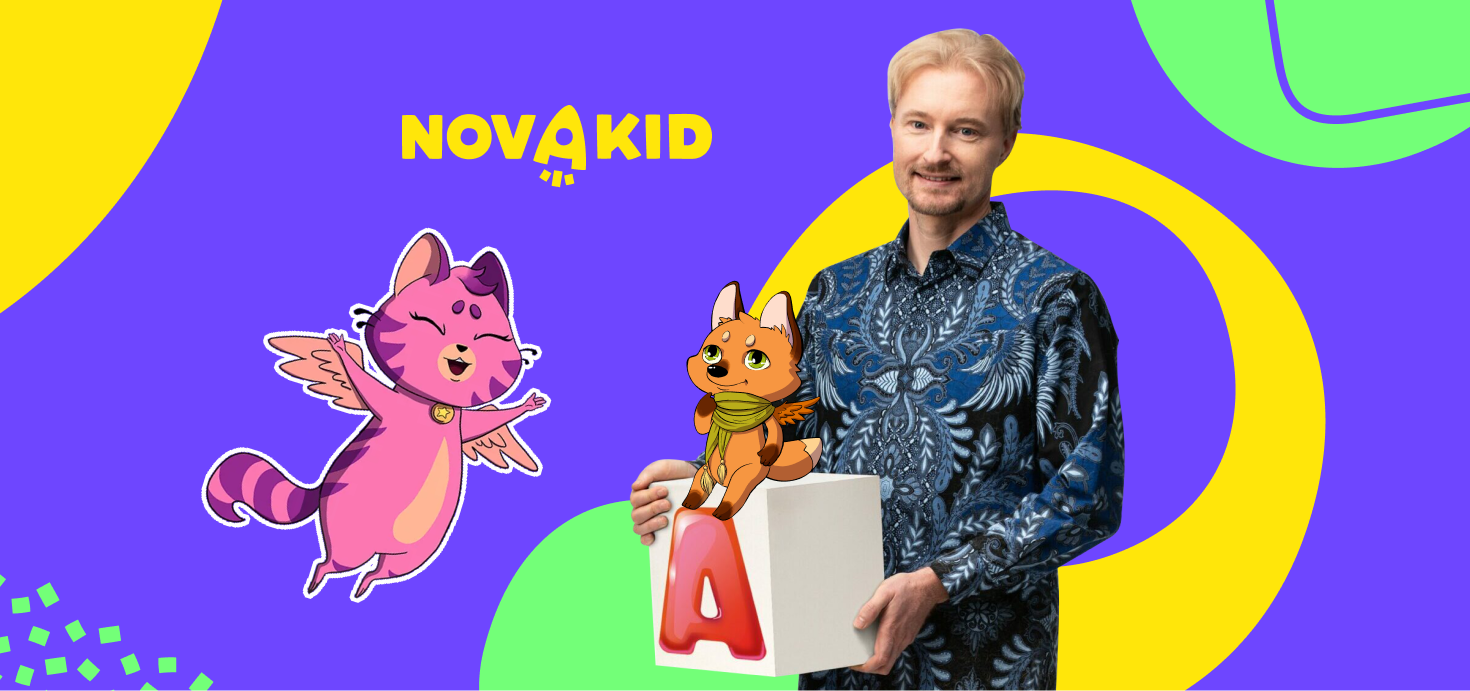Psychologist Gülizar Şehitoğlu: “Be patient, determined and create routines together”
Are you looking for advice on how to help a child get back into their school routine? Psychologist Gülizar Şehitoğlu shared her advice and tips to make the first few weeks of school a stress-free and exciting time for children.
Novakid: During the first few weeks of a new school year, kids experience so-called summer learning loss. Could you tell us about this phenomenon? Why does it happen?
Gülizar Şehitoğlu: It’s true that many children and parents are struggling with this issue after the summer, because it’s such a long period when kids pretty much don’t do anything. When we talk about the academic period, we mean cognitive gains: the learning function causes chemical reactions in the brain. These reactions change and evolve according to experience and repetition. And if they stop experiences; stop repeating things, they might, and we possibly lose some of the parts. Then, when the children return to school, they have difficulty remembering information that they have not repeated for a long time or period.
N: So the main point is that there is no recycling of the things learned during the school year, as the kids are not involved with learning activities in the holidays. Is that why things are forgotten very easily during the summer?
G.Ş.: Yes. I would add here that through our senses, we experience life. Experiencing is only possible with our five senses and our vestibular system. So, when the kids are at school, they experience the building, their Math lesson, their teacher – they experience all their learning activities. Also they experience their responsibilities during school. If they are not there, they don’t follow eight hours of activities and some cognitive gains.
N: Usually when kids go back to school, it takes them a while to get back into routine and they may not get good grades because they are not used to being in school. This could easily cause self-esteem issues. What can parents do to make their child feel secure?
G.Ş.: It’s necessary to see school life as a whole routine rather than just academic achievement. But first I think we need to talk about the routines, and what we mean by routines. I could say, as a frame, when we wake up, when we have breakfast, when we have free time, and the time that we have to be at school or at work, and the time that we are supposed to be at home. All these routines change during the summertime together with our nervous system.
That’s why we can expect a decrease in children’s performance at school after summer vacation. Mom and dad, the whole family, as a whole organism, changes during the summer. Not only the children’s daily routine, but our daily routine changes.
So, setting them altogether, as a whole mechanism, because this is not a thing that only kids have to follow, but we have to follow as well; we have to wake up a bit earlier: we prepare some breakfast, and keep them company, chat a little bit in the morning, and help them prepare to go to school and so on. We have to create the routine altogether from the beginning. I really need to emphasize that: creating routines not only for the kids, but the family as a whole.
N: Do you have any tips or advice on how to settle back into routines in a sane and healthy way for a family?
G.Ş.: Sure, but before giving my tips, I’ll share what I think is the most important information about this topic: understanding a child’s brain.
The prefrontal cortex, according to the latest research, keeps growing until we’re 28. Can you imagine? So, the prefrontal cortex of an adult helps us plan, and stick to it. I can see what’s coming; I can see that on Wednesday I have an important presentation, and I can manage my nervous system to prepare myself to be into it. So, as parents, sometimes we think that our kids’ brains work like ours, but they don’t. Their brains are not so efficient. They can plan, but it’s hard for them to stick with it. Understanding my kids requires understanding how their brains work. They need our company, and they need compassionate relationships first.
“Understanding my kids requires understanding how their brains work. They need our company, and they need compassionate relationships first”.
We need to create routines all together for ourselves and for them. Defining every single detail is key, because children need to visualize the future plan before they jump into it, so it’s vital to let them know what to expect. We need to explain the rules and what it will look like. So, on Monday, you will have an English class and a Math class, and you will be at school almost six hours, and I will be waiting for you at home at five o’clock, we will have dinner and then you will play with your best friend at his or her place.
N: Are there any gameful or interactive and fun for kids ways in which this introduction to what’s coming can be done?
G.Ş.: My first tip is creating routines together. For each activity, for example, sleeping, free time or reading books, or studying English, they can create some kind of colorful stickers, and every sticker or symbol could mean a specific activity. It’s important not to leave the kids alone. Be with them while they’re preparing their colored schedule.
“Be patient and determined. Because, in the beginning, I tried to explain how their brain works and their lack of capability of planning and sticking with the plan. Probably they would like to do something else, not to follow the routines. We have to be there, because also leading them properly is the key.”
As a second idea, you can think of as many activities as you can and share with a child. Then prepare two different columns, and one column shows them things they can do alone, and the other column things you could do together. For example, reading can be done alone or together. Or a child could say that ‘I want to go out, and I want to play with my friends in the garden,’ ok? And this is alone. ‘I would like to go to the cinema with you, mom.’ Yeah, we can do that together. So, creating that should include some individual activities and family activities together, so they can create different columns.
My third tip is make sure to include free time in your routines. Because when we talk about routines, we think that routines only include to-do lists. This is not the case. You can find a symbol that represents free time. For example, a picture of a flower or a picture of the sun or moon, or whatever they would like to draw with some colorful pens.
The fourth, I think, overall, this is the most important thing: be patient and determined. Because, in the beginning, I tried to explain how their brain works and their lack of capability of planning and sticking with the plan. Probably they would like to do something else, not to follow the routines. We have to be there, because also leading them properly is the key.
N: Another question related to routines and motivation to do them: how to increase a child’s motivation to come back to studying, to school?
G.Ş.: This question can be divided in two parts, because there’s a pre-school time and the actual first weeks at school.
When we talk about the pre-school weeks, some cool stationery can motivate them: new bags, colorful pencils, notebooks with their favorite characters. I think it’s so important to remind them about their achievements, talking about some school trips and some really enjoyable activities they made last year. Ask them specific questions and they would like to talk about it. Mostly do not reply to general questions. When you ask your kid, like “what do you remember from last year?”, most probably they will answer “nothing.” It’s too general. But if you ask them “Ah! Do you remember how you did well at your science class? Wow, that was amazing!”, you will for sure make them excited about speaking on this topic.
Regarding the second part, the time right after they start school, it’s not only the responsibility of the parent to increase and protect the motivation of the student about school, it’s also the teacher and school counselor, and relationship with friends.

“If you ask them “Ah! Do you remember how you did well at your science class? Wow, that was amazing!”, you will for sure make them excited about speaking on this topic.”
N: You said it’s important to be with a child in this period and support them. For parents, back to school is also quite stressful! How can parents manage their stress and not transmit it to their child?
G.Ş.: The stress in the family is contagious, that’s true. If something goes wrong, or something goes activating in our nervous system, we spread it; we share it. This is inevitable. So, knowing this information, as a parent, we have to learn some self-regulation ways such as controlling our breathing, for example. This is one of the ways. We could also discover paths for our nervous system, it could be walking, sharing some spare moments with our friends, gardening or cooking. First, meeting our needs as a parent is a good start. So, starting from ourselves, regulating our nervous system, is the key for this process.
Did you like the article?








































